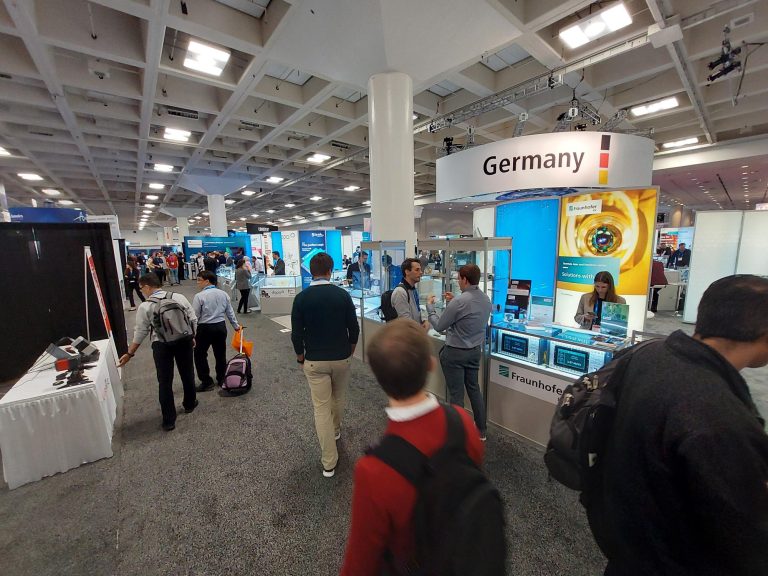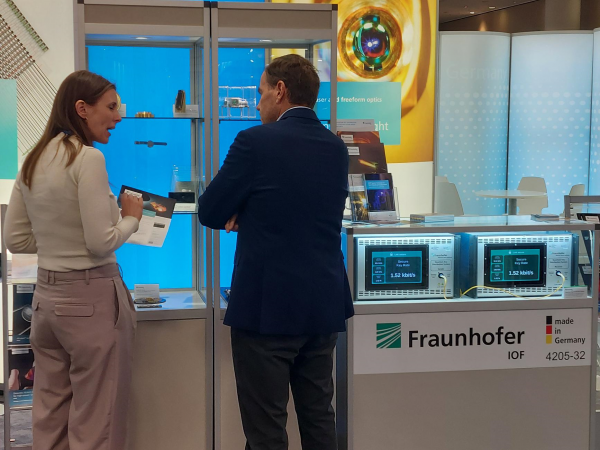Berlin, Braunschweig | 11 to 14 November 2024
QuNET at the Quantum Symposia 2024: Advances in quantum communication
In November 2024, QuNET presented its latest developments and innovations in secure quantum communication at two key events: the Bundeswehr and BWI Quantum Symposium in Berlin on 14 November and the Quantum Communication Symposium Germany in Braunschweig from 11 to 14 November.
Quantum key distribution using mobile platforms: Presentation of results from SE2, in particular the development of a mobile experimental platform for ad-hoc quantum key exchange. Demonstration of the technology for horizontal links and for use with flying platforms (e.g. aeroplanes). Outlook for SE3, in which the technologies will be further scaled and expanded in an application-orientated manner.
Expert exchange and panel discussions: In Berlin: participation in the panel discussion ‘Quantum meets Security’ with experts such as Imran Khan (KEEQuant), Kevin Füchsel (Quantum Optics Jena) and Manfred Lochter (BSI). The exchange emphasised the relevance of quantum communication for secure networks of the future. In Braunschweig: Prof Martin Schell (HHI) represented QuNET in a high-calibre discussion on the practical implementation of testbeds and their significance for the future of quantum communication.
Project presentations and testbeds: Presentation of the QuNET testbeds and practical applications of quantum-safe communication in both formats. Project pitches and expert discussions showed concrete progress and new perspectives of the research initiative.
Stand presence and exchange: At both events, QuNET informed the specialist public about the current state of development and facilitated an interdisciplinary exchange on QuNET technologies.
By participating in these events, QuNET presented important steps towards realising secure quantum communication networks and showed how innovative technologies for key distribution are already being tested in mobile and industrial scenarios.
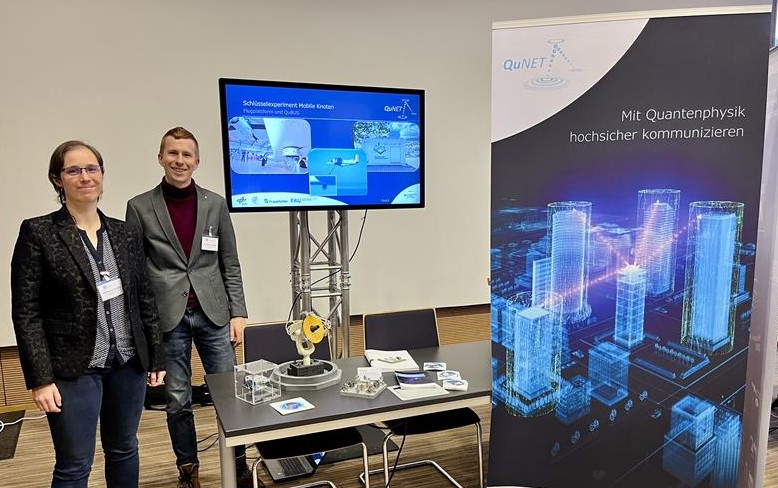
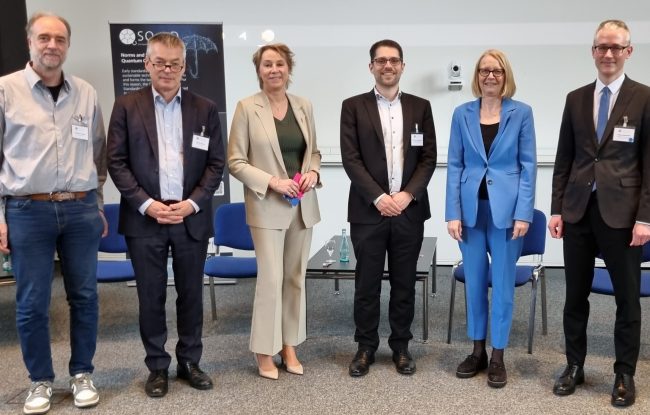
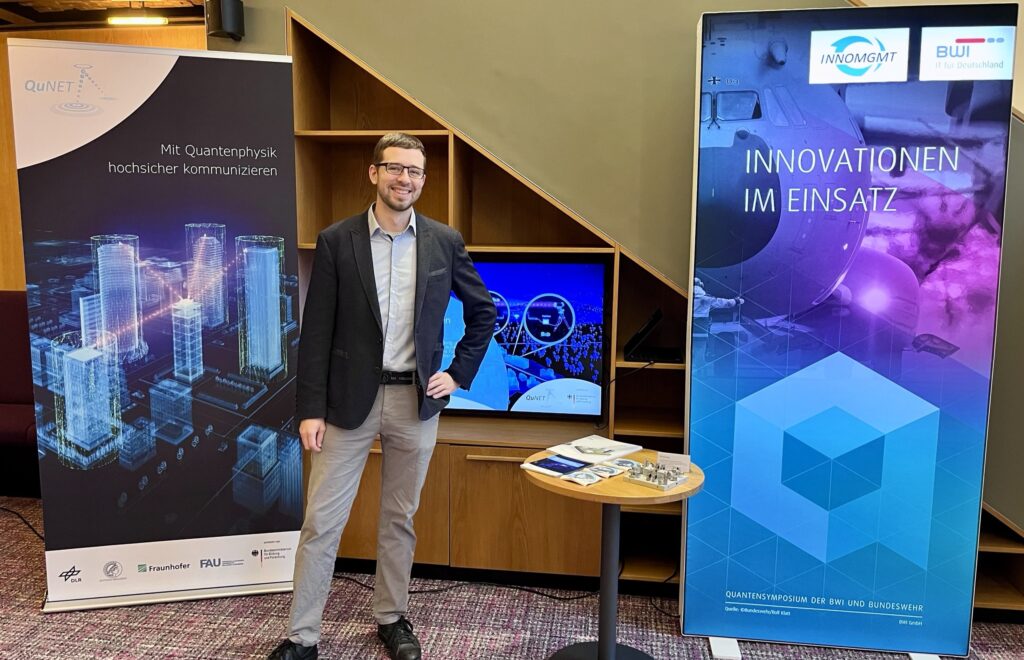
The forum for quantum communication in Germany
At the ‘Forum for Quantum Communication in Germany’ on 17.10.24 at the Fraunhofer HHI, State Secretary Dr Roland Philippi emphasised the central role of research funding by the BMBF. This is crucial for strengthening IT security and technological sovereignty. The event was organised by the BMBF-funded networks QR.X, QuNET and SQuaD and brought together leading representatives from research, industry and start-ups. The aim was to highlight prospects for quantum communication in Germany and present concrete progress.
The QuNET initiative demonstrated quantum-secured data transmission in Berlin’s inner-city network, a possible approach for the secure transmission of personal data in digital government services. QR.X presented quantum teleportation as a technological cornerstone for future quantum networks. The SQuaD umbrella project provided information about its support for technology transfer and the development of an innovation ecosystem for quantum communication in Germany. The forum’s selected discussion topics included research & development, transfer & value creation, data sovereignty, IT security research, training & careers and EU & international perspectives. Research projects and industry from the field of quantum communication were presented at kiosks.
In order to promote exchange within the forum and to honour the BMBF’s pioneering funding strategy, an impulse paper on the topic of quantum communication was drawn up from the midst of the research and industry ecosystem in the run-up to the forum and ceremoniously presented to the BMBF State Secretary Dr Roland Philippi at the event.
You can find more information about the event at the BMBF and the Fraunhofer HHI.
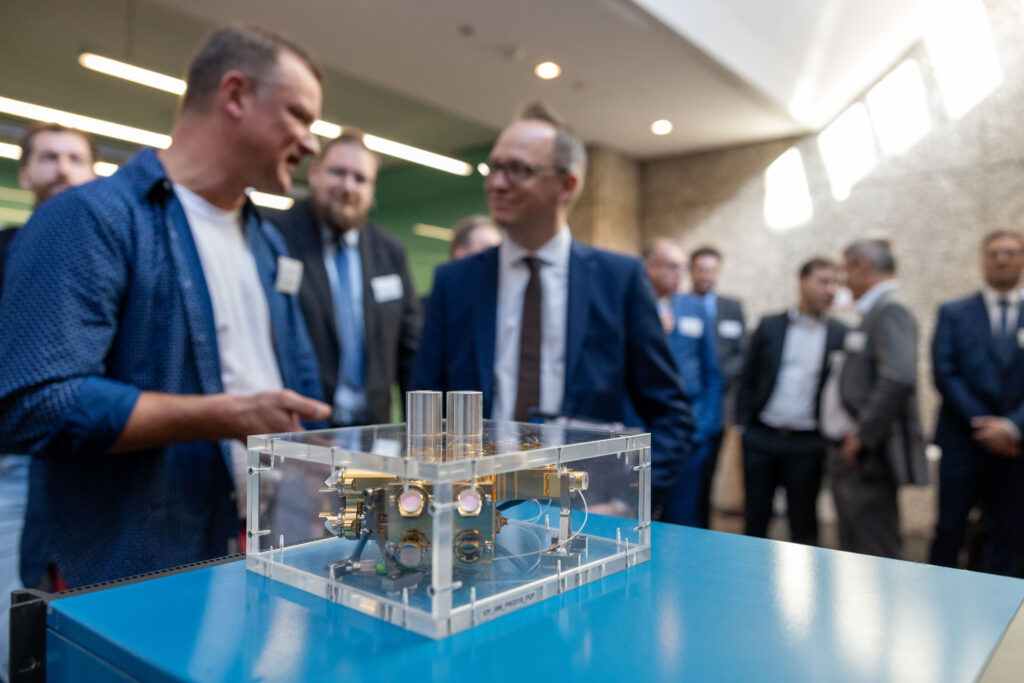
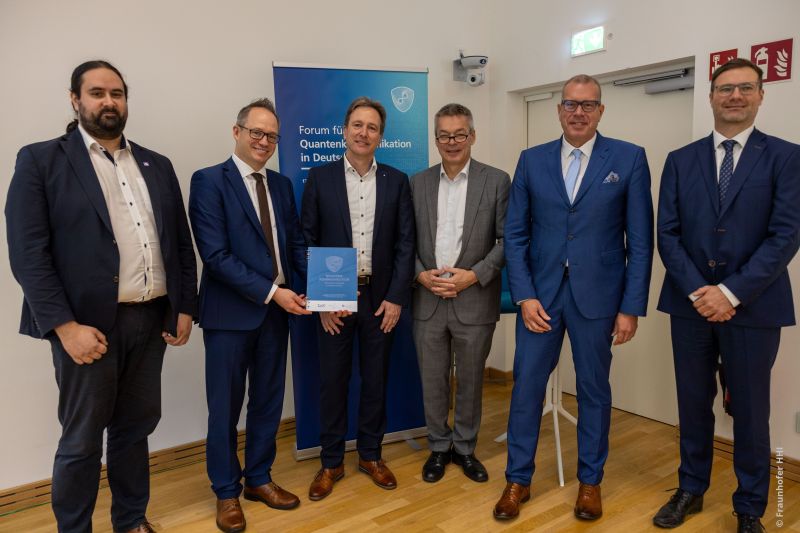
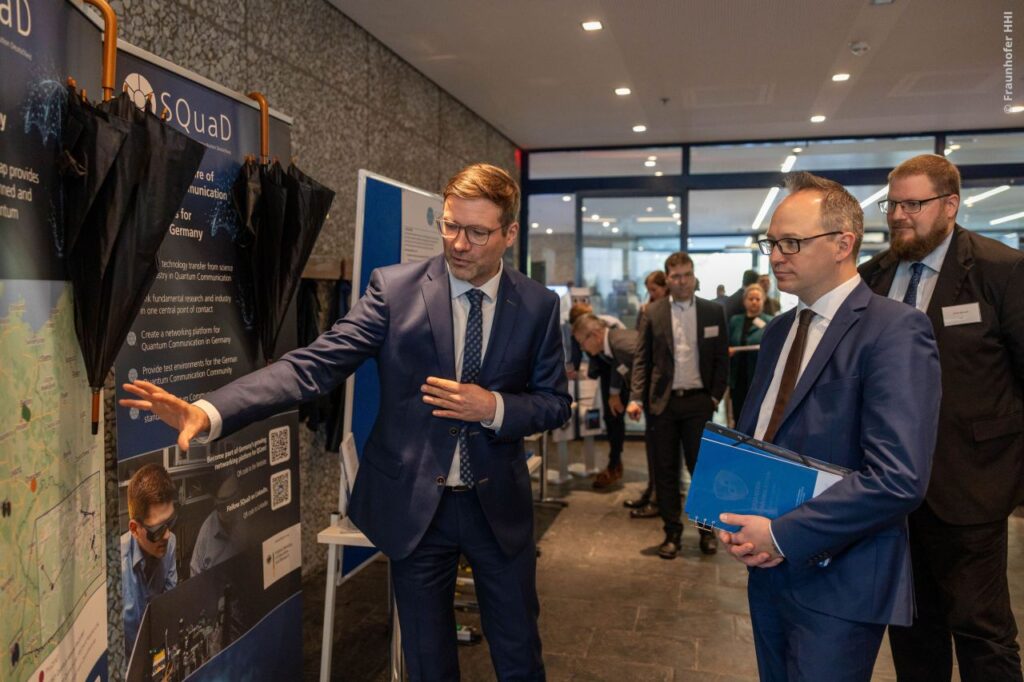
Flight campaign #1 of key experiment 3 - quantum communication in the air
The video shows the completed preparations for the third key experiment of the QuNET initiative: acceptances, tests, certifications and the installation of the optical communication terminal in a Dornier 228. The aircraft of the DLR research fleet is used as a mobile node to establish an optical link to a ground station. The aim is to demonstrate and further develop mobile quantum communication using QKD.
More information on the current experiment can be found here: Link.
QuNET general meeting 2024
The DLR Institute of Communications and Navigation hosted the QuNET General Assembly 2024 in Oberpfaffenhofen. The two-day event provided updates on the latest project developments. A poster session provided an ideal opportunity to exchange technical details and deepen both new and existing partnerships. The lab tour gave participants the opportunity to experience the ongoing work at QuNET first-hand. They visited the German Space Operations Centre, the Optical Ground Station Oberpfaffenhofen, the DLR Do228 aircraft with installed laser terminal and the Fraunhofer IOF QuBUS with an adaptive optics system.
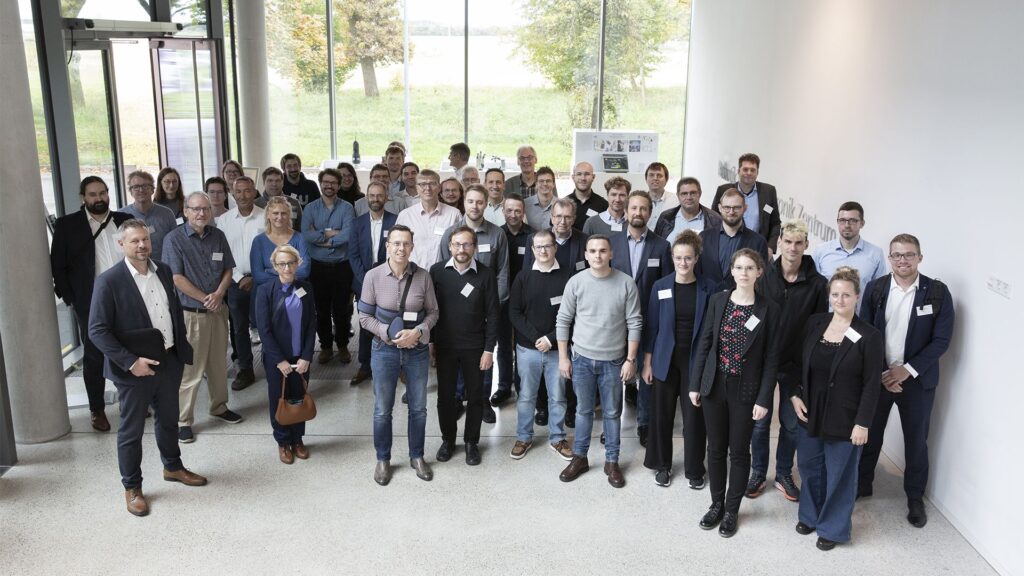
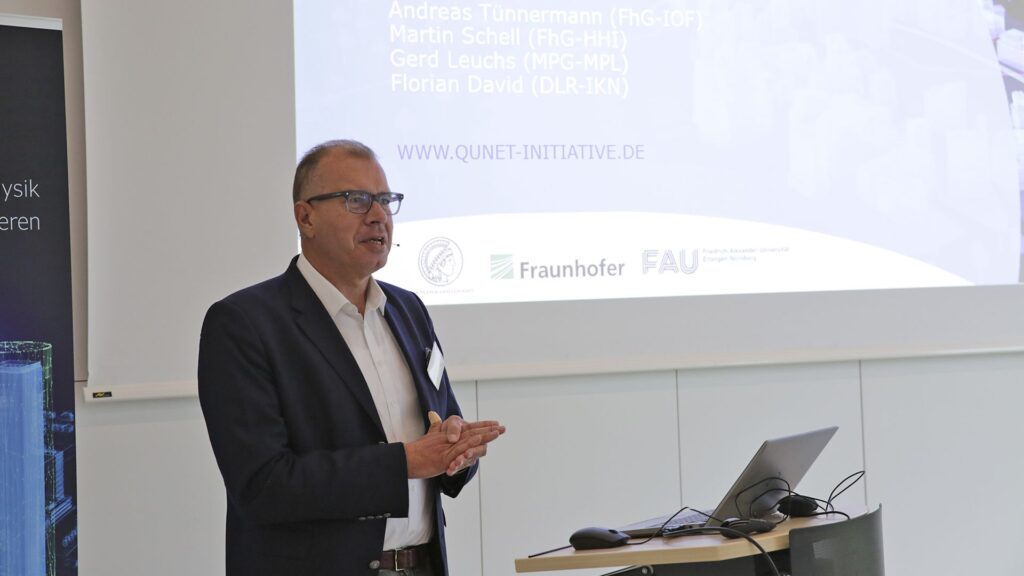
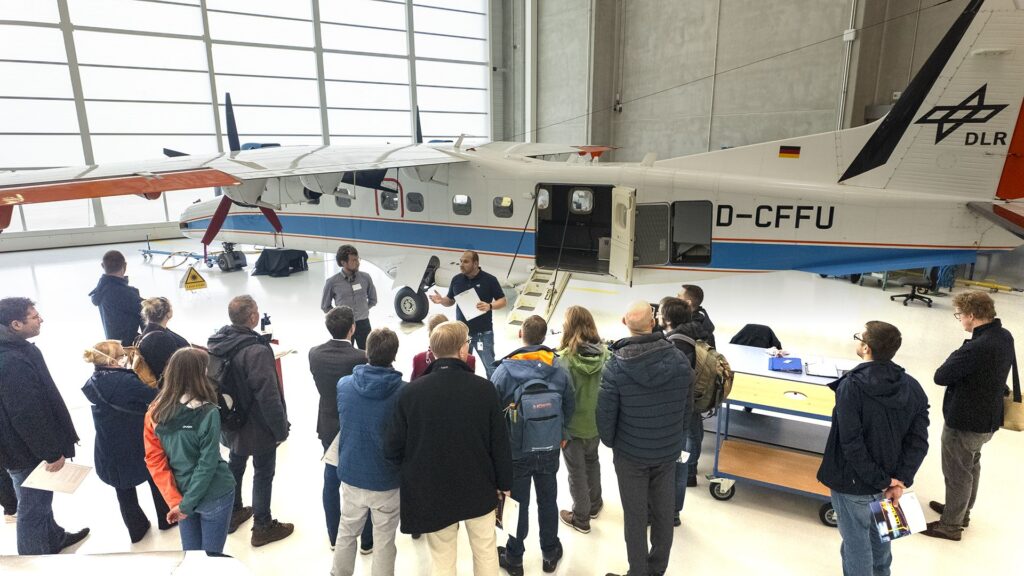
Start of the second key experiment of the QuNET initiative for secure quantum communication
QuNET has started the main phase of the second key experiment to develop highly secure QKD-based communication systems. For the first time, several users in the Berlin metropolitan region, including the sites of Fraunhofer HHI, Deutsche Telekom and the Bundesdruckerei Group, will be connected quantum securely via 125 km of fibre optic and free beam connections.
The experiment marks an important milestone for secure communication networks in Germany. Dr Nino Walenta leads the team of 30 researchers. Read more about quantum research and the key experiment 2 in the press release of the Federal Ministry of Education and Research BMBF.
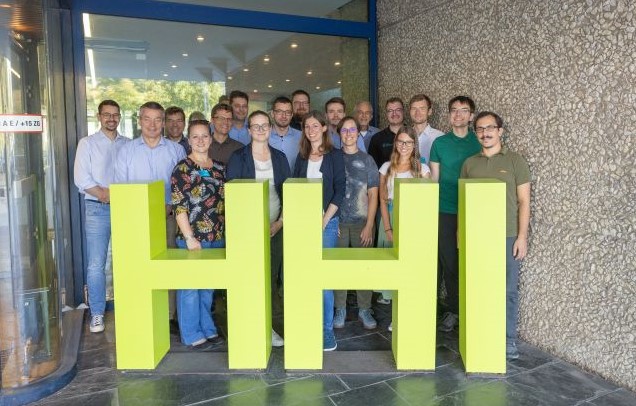
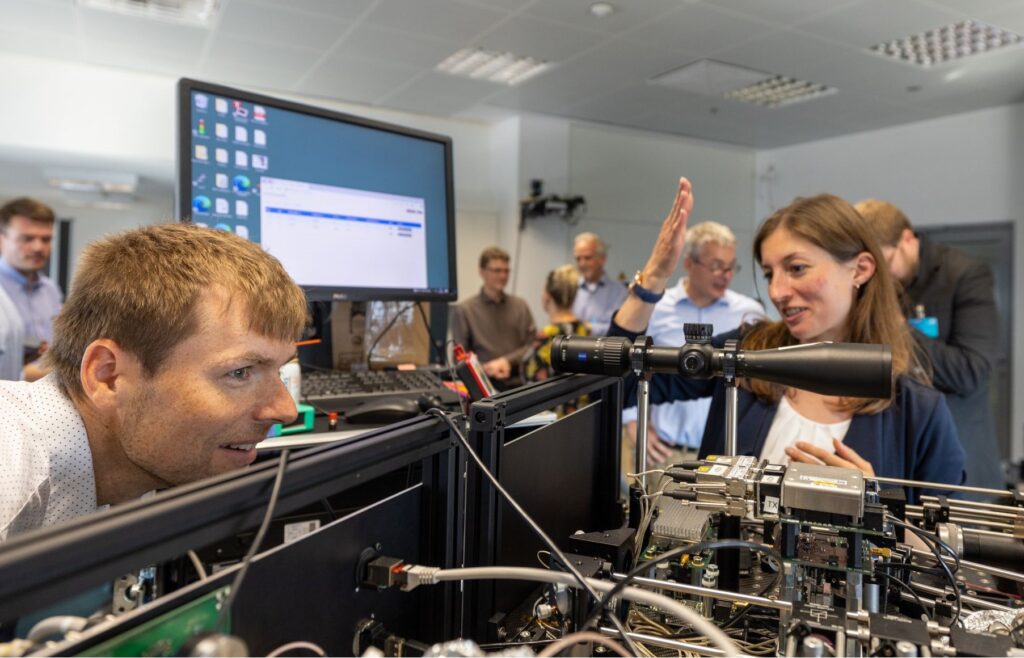
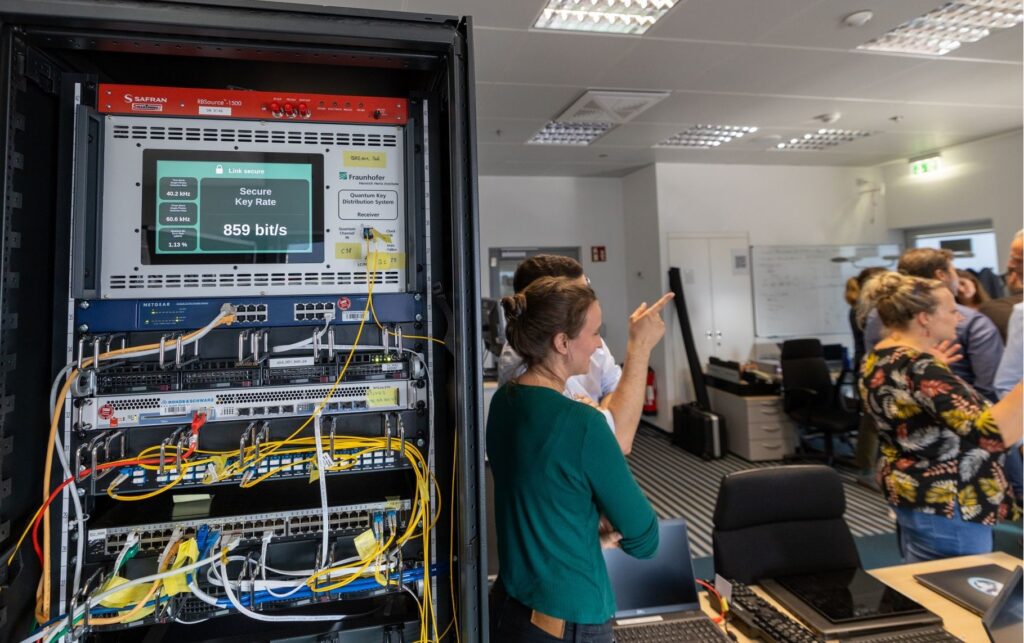
All core institutes in Berlin united for the start of the SE2 experiments
All five core institutes of the QuNET initiative are on site in Berlin to finalise the last set-ups and preparations for the SE2 experiments. The actual experiments, which will begin on 16 September, represent a significant step in the development of quantum-safe communication networks in Germany.
At the Heinrich Hertz Institute (HHI), Nino Walenta is leading the SE2 experiments. The HHI is applying its expertise in photonic technologies. The Fraunhofer Institute for Applied Optics and Precision Engineering (IOF) contributes to the development of optical systems for quantum communication, which are necessary for high transmission reliability. The DLR Institute of Communications and Navigation is significantly involved in the integration of QKD systems into existing networks, in particular through research in the field of satellite-based quantum communication.
The Max Planck Institute for the Science of Light (MPL) and Friedrich-Alexander-Universität Erlangen-Nürnberg (FAU) are working closely together to develop innovative solutions for quantum key distribution (QKD).
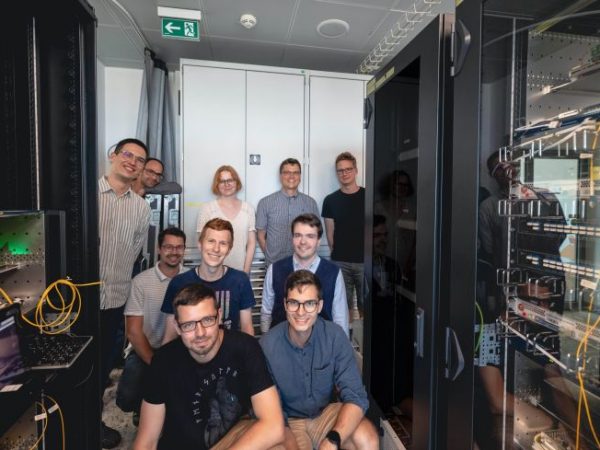
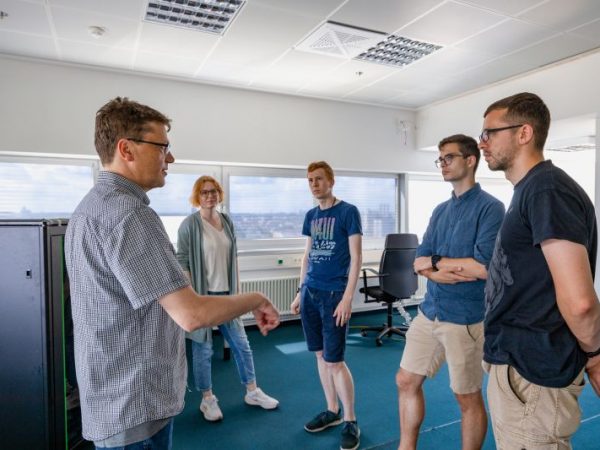
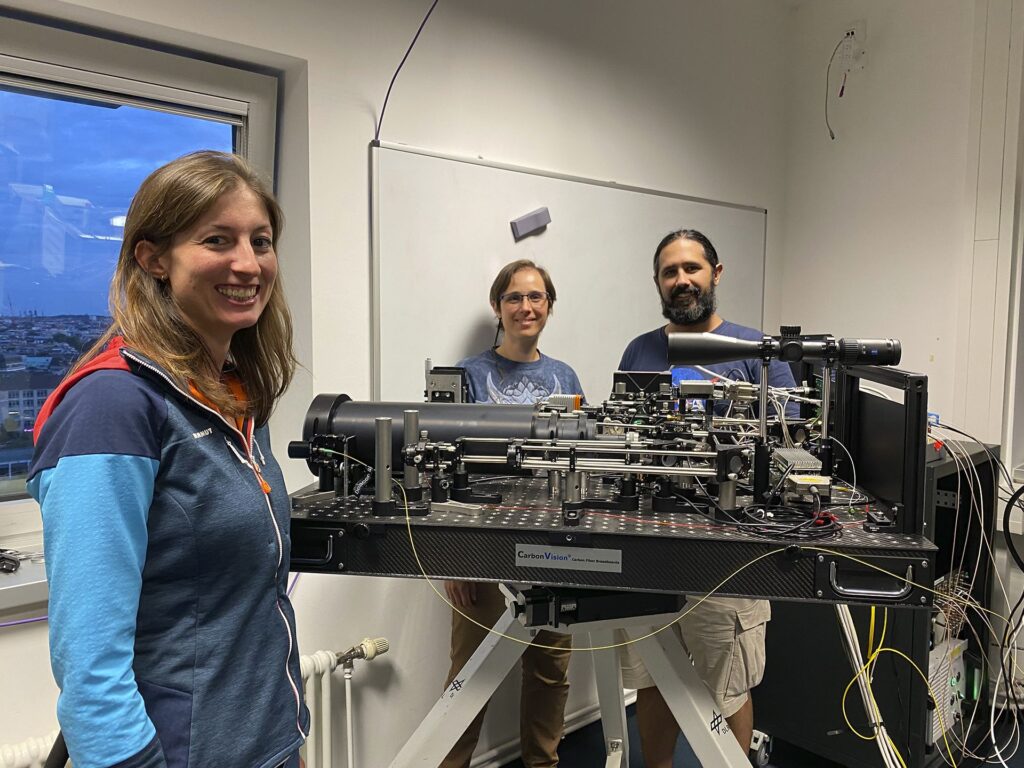
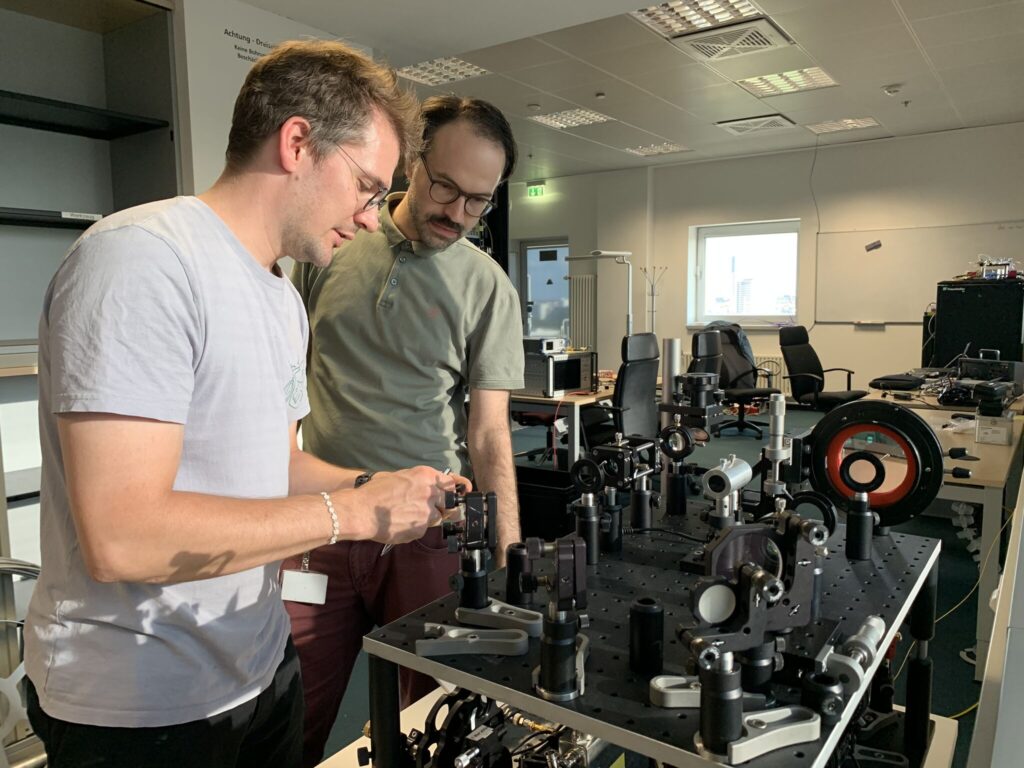
Key experiment of the QuNET initiative: Highly secure quantum communication in an urban environment
Starting signal for ground-breaking quantum communication experiment in Berlin
As part of the third large-scale experiment, an urban network with several users in the Berlin metropolitan region will be connected for the first time in a quantum-safe manner via point-to-point connections. The Fraunhofer HHI sites at Einstein- and Salzufer as well as Deutsche Telekom and Bundesdruckerei GmbH will be connected via a 125 km long fibre optic network and additional free beam connections in the air.
A particular focus is on investigating how digital services in the quantum age can be made highly secure through collaboration with Bundesdruckerei GmbH. Sensitive data is exchanged between various institutions in Berlin and protected by quantum cryptography.
Complete overview of the key experiment: Link
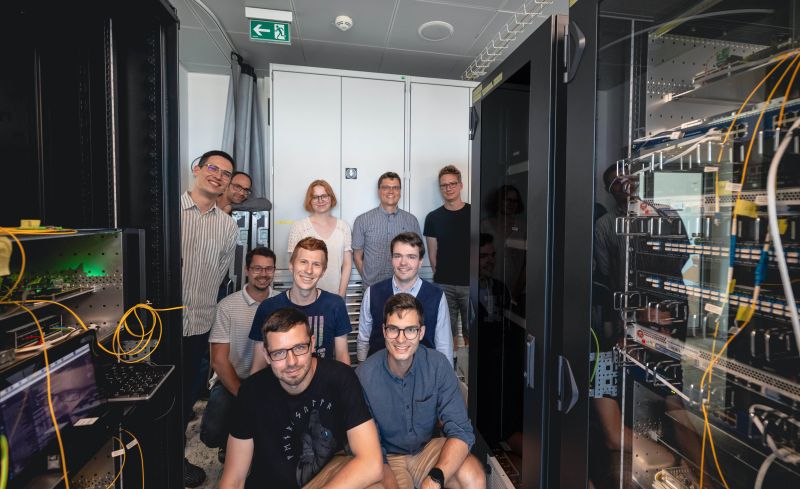
Start of the last QuNET+ projects
The kick-off meetings for ICLink, BlueCert and OptiRoute took place at various locations in March
The QuNET+ICLink kick-off meeting took place on 5 March 2024 at the Institute of Solid State Physics at TU Berlin. Participating institutions such as Skyline Photonics GmbH and the Technical Physics Department of Julius-Maximilians-Universität Würzburg came together to present their projects and work packages and to discuss interfaces between the partners. Even though no photos of the event are available, the participation of renowned institutions shows the great interest and commitment to the development of quantum communication systems.
The QuNET+BluCert project started with a successful kickoff on 13 and 14 March at BearingPoint’s German headquarters in Frankfurt am Main. The kickoff included presentations from all partner organisations as well as three different workshops that paved the way for the upcoming challenges in this project. The project focuses on building a certification lab for quantum key distribution (QKD) technology to overcome the certification hurdles and promote the acceptance of this technology.
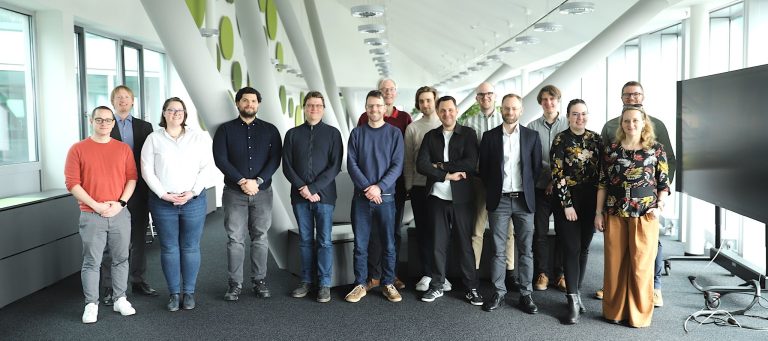
The QuNET+OptiRoute project was successfully launched on 21 March with a kick-off meeting at the Nokia site in Nuremberg. Michael Bärnreuther, project coordinator, emphasised the importance of highly secure communication with quantum technology. The project focuses on simultaneously routing conventional and quantum signals in fibre optic networks in order to advance quantum communication. Nokia is working with partners such as FAU Erlangen-Nuremberg and the Fraunhofer Heinrich Hertz Institute HHI to tackle the challenges over the next three years.
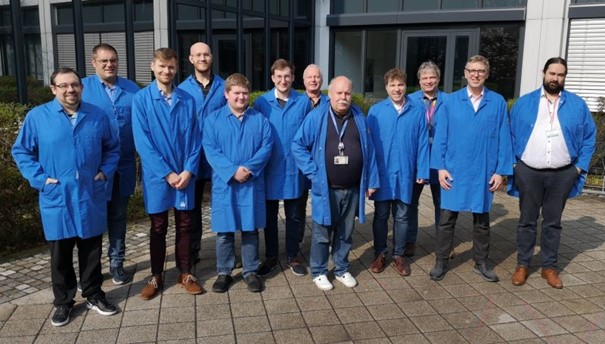
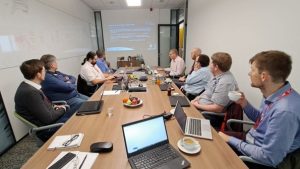
Specialist group meeting of the QuNET initiative
QuNET develops highly secure communication systems based on the latest quantum technology.
In the first week of March, experts Dr Nino Walenta, Jan Krause, Dr Andy Schreier, Stephanie Renneke, Jerome Wiesemann, Dr Moritz Kleinert, Martin Kresse, Dr Patrick Runge and Pascal Rustige met with 54 participants from industry and research as part of the QuNET initiative, including their 12 QuNET+ projects, in our Science Tech Space showroom.
The discussion on how a QKD network for the secure exchange of information between authorities can be realised was particularly exciting. Important research needs were identified in various working groups and future key experiments were planned.

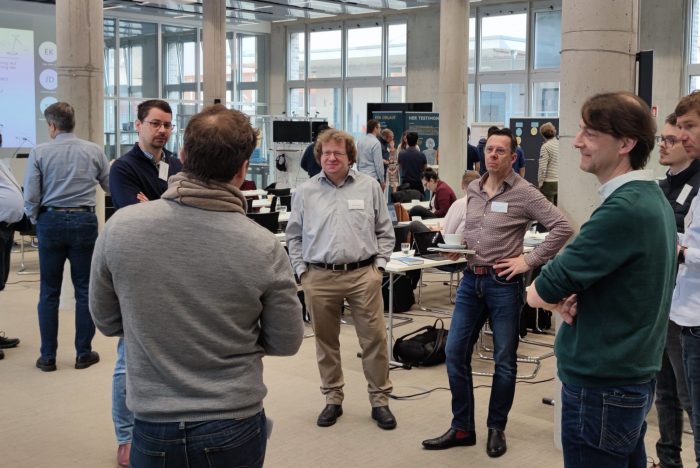
QuNET-Initiative beim Besuch des deutschen Bundespräsidenten
Fraunhofer IOF presents quantum key distribution model to the Federal President as part of the QuNET initiative for highly secure communication systems and emphasises the pioneering role of quantum research in global communication systems.
The QuNET initiative, which is funded by the Federal Ministry of Education and Research, is developing the foundations for highly secure quantum communication systems using state-of-the-art quantum technology. The systems for practically tap-proof communication can thus pave the way for long-term data security and technological sovereignty.
On the occasion of the Federal President’s visit to Fraunhofer IOF last week, QuNET researchers presented a model for quantum key distribution (QKD). It demonstrated the exchange of quantum keys between a satellite and two ground stations. Such a system could one day form the basis for a global quantum network.
Frank-Walter Steinmeier was able to experience the exhibit and the research behind it up close and observe how interference signals can be detected by changing the quantum states.
Fraunhofer IOF is also researching the future of communication with quanta in other projects such as HYPERSPACE, thus emphasising the importance of quantum research in the field of global communication systems.
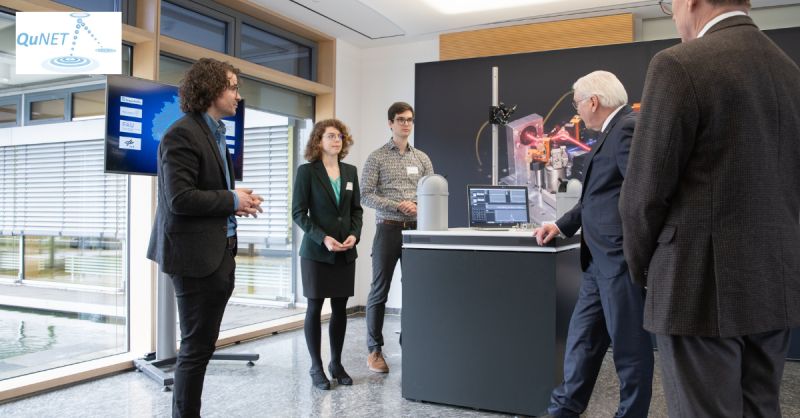
San Francisco /30 January to 01 February 2024
QuNET initiative at the SPIE Photonics West 2024
The QuNET initiative presented its current systems for secure quantum communication at the largest international trade fair for photonic technologies.
From 30 January to 1 February, SPIE Photonics West, the largest international trade fair for the latest developments in the field of optical and photonic technologies, invited representatives from research and industry to San Francisco. The QuNET initiative was also represented at the trade fair with its current technology systems for secure quantum communication.
The consortium was able to show interested visitors the range of its current research into highly secure communication systems using various exhibits. For example, the transmission of entangled quantum states between a satellite and two ground stations was clearly demonstrated using a model for quantum key transmission (QKD). This illustrated the potential of quantum technologies and the systems developed by the QuNET initiative in the field of practically tap-proof communication.
